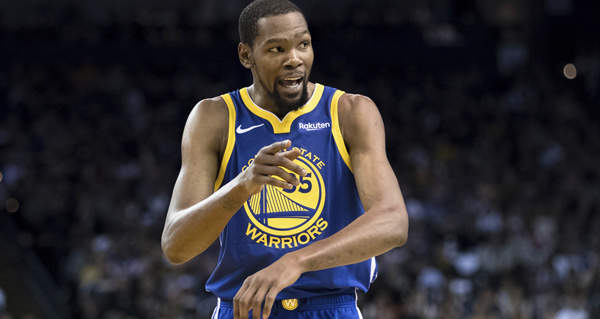The ball moves more frequently, for a fact, and there are prolonged stretches in which the Kevin Durantless Warriors seem to operate as if controlled by a single mind. Everyone is helping each other out. Draymond Green receives the ball just below the three-point line as Steph Curry flares behind him off an Andre Iguodala screen. Klay Thompson abandons the arc and cuts toward the basket and Kevon Looney shuffles along the baseline in search of a rebound or dunk.
This all happens at great speed, like a conversation composed entirely in shorthand, and the defense can’t keep up. You’re not going to win a contest of connectivity with these Warriors, and moreover it’s impossible to shut down three threats at once. The guard dies on the screen, or the big man gets caught between Looney and Klay, somebody’s guarding the cartoon dust cloud where their man used to be. Steph drills a triple, Klay lays it in, Looney catches the ball, ESPN cuts to commercial, and upon returning from break, we watch him bash the ball through the hoop without difficulty.
Durant participates in this kind of complex kineticism too, but just as often he stands apart from it. This isn’t his surliness manifesting itself in his play; it’s sound strategy. All the pretty choreography Steve Kerr favors so strongly is pointless in the face of the reality that sometimes the Warriors’ best move is to toss the ball to their lanky seven-foot assassin at the elbow and hang out while he scores three, four, five times in a row. Steph doesn’t need a screen; Klay doesn’t need to cut. They stand around and catch their breath while—feint, dribble, dribble, turnaround, swish. Then everybody gets back on defense.
It’s worth noting that these particular Warriors—the players who finished off the Rockets and swept the Blazers—aren’t exactly what they seem. It’s one thing to turn in a couple weeks of blistering work and another to maintain that level over the course of a season, or even just an entire postseason. And though the principles are ostensibly the same as on the 73-win worldbeaters, they’re all older—you’ve changed in three years, haven’t you?—and the roster is thinner at the edges.
A team doesn’t explain itself in five games; that’s not a sufficient amount of time. But we know enough to posit these new-old Warriors as title favorites against either the Bucks or the Raptors. It doesn’t seem like Durant’s going to return from his calf strain until the middle of that series, and there’s an outside possibility he won’t be back at all. It’s not unreasonable to ask whether that affects the odds in one direction or another. This isn’t to claim that Durant is inconsequential, because we’ve all seen him take over games, nor is it to claim that the Warriors are actually better when he’s not on the floor, because that hypothesis is both improbable and unprovable. Here is where the emphasis should go: the Warriors are so good that minus their best player—maybe the best player in the league—they’re still the team to beat.
And if we take as an assumption that the job gets done either way, then it appears as if pretty much everybody—Golden State fans, the players, impartial NBA-watchers—would rather the Warriors won their championship without Durant’s help. (Grand consensus is always an illusion; KD has his supporters.) The aesthetics of their play improve, goes one argument. The whole team’s talents are employed more fully, goes another. Kevin Durant is a world-historic herb, is a third point of view.
Durant obviously senses this antipathy. Otherwise he wouldn’t be, for instance, skimming Instagram comment sections to beef with internet randos who aren’t even saying anything bad about him. Parsing what’s wrong with Durant is heavy lifting—there’s some deep-down unhappy throb that’s not getting sufficient attention—but this particular crisis is plenty legible: laid up with a bum leg and his team thriving, he’s at the height of his anhedonia, scarfing down every bit of criticism levied against him and inventing new grievances to sate his persecution complex. When times get tough, shooters shoot, drinkers drink, and posters post. And Kevin Durant is not one to keep his bad time to himself.
He’s 30. This is who he is, and that’s fine as far as it goes. It is not his job to be pleasant, but you also couldn’t blame his teammates for being more than a little bit sick of his behavior, or even if they don’t actively dislike Durant, feeling a certain weight lifted when not having to work with a guy who’s so domineeringly miserable. Maybe that’s what people mean when they say they like Golden State better in this Durant-free state: they’re once again buoyant.
It would be fitting if the Warriors won their third title in as many seasons with Durant halfway present, if he showed up in Game 3 to help them complete a gentleman’s sweep over the Raptors or Bucks. It would summarize his time in Oakland aptly, as a great player who was on the Warriors if never quite a part of them. They likely could have accomplished spectacular things without him, but it was easier with the aid of his immense talent. And eventually it became harder, in psychic if not basketball terms, so Durant left for his own team—respected, decorated, not truly loved, muttering something poisonous beneath his breath.



